
Lit Hub's Most Anticipated Books of 2020
A Look Ahead at the Year in Reading
MARCH
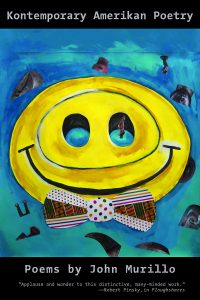 John Murillo, Kontemporary Amerikan Poetry
John Murillo, Kontemporary Amerikan Poetry
Four Way Books, March 2
John Murillo’s second volume of poetry is an illuminated mediation on the way memory throws shadows on the wall. How we see ourselves in the past, as participants, or watchers, looking at injustice. Like Aracelis Girmay’s Teeth, this is a book of personal archaeology. The poet lays out his findings, tenderly, dating them, a poem from Ontario, California, in this year, when something nearly lethal happened, an event that could have changed the course of his entire life. In other places, the poem squeezes into a small line, slipping into the crawl spaces where relics were kept. A .45, a father’s war medals. The accoutrements of violence. Would he use them? Would he disinherit himself? Would his spirit hold? What a powerful book this is, told in a tone without trembling, nor any bravado. Lines of it will linger on your retina afterwards like these poems have been shown to you, in lamp light, or fire. –John Freeman, Lit Hub Executive Editor
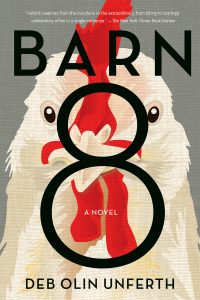 Deb Olin Unferth, Barn 8
Deb Olin Unferth, Barn 8
Graywolf, March 3
Look, I love Deb Olin Unferth, and it is my policy to read anything she writes. That would be true even if I had only read this one piece of flash fiction by her, but I have read almost all of her books, and my policy stands. I once went to a reading she gave and had to take notes on my arms in eyeliner because I’d forgotten my notebook. Anyway. In her latest book, two egg industry auditors (yes) decide to attempt “one of the greatest animal heists in history” (oh yes) by stealing a million hens from an Iowa egg farm. Unferth is the master of being funny and political and weird and serious at the same time, and this book sounds no different. Can’t wait to crack it open. (Sorry not sorry for this egg pun.) –Emily Temple, Lit Hub Senior Editor
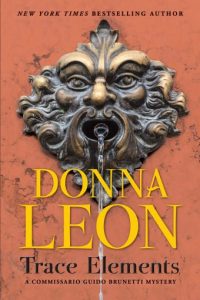 Donna Leon, Trace Elements
Donna Leon, Trace Elements
Grove, March 3
In Donna Leon’s latest, Commissario Guido Brunetti and his colleague Claudia Griffoni are called to a hospice to witness a patient’s dying words. She’s convinced her late husband’s death was no accident, and only manages to mutter a few phrases indicating a debt to a dangerous lender before expiring. It’s up to the Commissario to investigate, especially as he’s never been able to let an unsolved mystery go. –Molly Odintz, CrimeReads Associate Editor
 Edward Achorn, Every Drop of Blood
Edward Achorn, Every Drop of Blood
Atlantic Monthly, March 3
Wish you’d been at Lincoln’s inauguration? Here’s your ticket. Drawing on historical wizardry—diaries, accounts, and memoirs—Achorn has assembled a prismatic portrait of that fateful day which reads like one long rolling dolly shot of history. Some of the figures are unknown, whereas others, like Walt Whitman, have figured largely in Lincoln’s presidency. And yet Achorn manages to retrieve new information, showing what Whitman, on assignment for the New York Times, conceived of as news. Frederick Douglas also looms large, but Acorn has a tougher time of accessing his essence. In a time of bot-and-propaganda enhanced actual divisions in America, this book argues the republic has been there before and got through, though it took a lot of blood. –John Freeman, Lit Hub Executive Editor
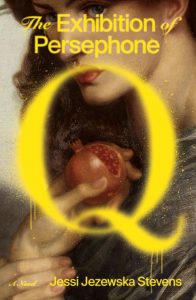 Jessi Jezewska Stevens, The Exhibition of Persephone Q
Jessi Jezewska Stevens, The Exhibition of Persephone Q
FSG, March 3
At the beginning of this cool-toned debut, Percy has not yet told her husband she is pregnant—nor that she has been waking up in the middle of the night and pinching his nostrils closed, to no apparent purpose. Then she receives a mysterious package in the mail: inside, the catalogue to a photography exhibit—the photographs taken by her ex-fiancé, the girl in them bearing an uncanny resemblance to her own self. Odd and diffuse, it’s a worthy addition to the field of cool-girl lit. –Emily Temple, Lit Hub Senior Editor
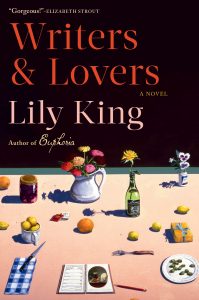 Lily King, Writers & Lovers
Lily King, Writers & Lovers
Grove, March 3
Casey is 31 years old, a waitress clinging to dreams of becoming a writer. Her mother is dead, she is torn between two men who are polar opposites, and she is an absolute delight to spend time with. The pleasure of reading this novel comes from walking alongside Casey in her everyday life. Her wandering, her waffling, her indecision, her panic—all relatable. The characters feel like flesh and blood humans. The specificity with which she describes the nuances of working in a restaurant—all spot-on. You’re right there with her, and she makes for great company. –Katie Yee, Book Marks Assistant Editor
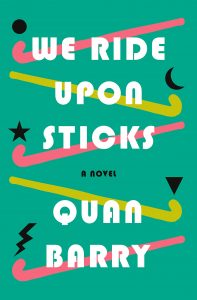 Quan Barry, We Ride Upon Sticks
Quan Barry, We Ride Upon Sticks
Pantheon, March 3
All I had to know about this one to get excited for it was that a) it is about a girls’ field hockey team in Danvers, Massachusetts in the 1980s and b) the field hockey team signs a dark pledge to Emilio Estevez in order to win games (why didn’t our soccer team ever think of that) and c) it works, but also rather goes awry. Of course it does. Now that I am halfway through, I can confirm that it is a) truly laugh out loud hilarious (and if you knew how cold my heart was this would mean more to you) and b) an ode to the actual, not all that intense female friendships most of us had in high school and c) the most pleasurable book I’ve read in a long, long time. –Emily Temple, Lit Hub Senior Editor
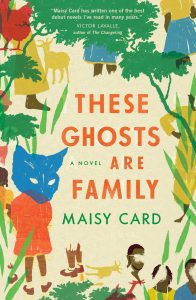 Maisy Card, These Ghosts Are Family
Maisy Card, These Ghosts Are Family
Simon & Schuster, March 3
At the center of Maisy Card’s novel, These Ghosts Are Family, is a Jamaican family that has moved from colonial Jamaica to present-day Harlem. The drama unfolds after Stanford Solomon reveals that he is not really who he says he is: he faked his own death, stole the identity of a friend, and is really Abel Paisley. Over the course of the novel, the fates of the Paisley family members come untethered and the narrative shows the impact that Abel’s choices have had on them. What make dramas so interesting, despite their common themes of identity and family relationships, are the particular circumstances and depth of their characters. These Ghosts Are Family operates on two levels: it pursues the personal (e.g., infidelity, lies, betrayal) while also exploring the universal; through the lens of one family, it confronts the enduring traumas of colonial history, slavery, and forced migration. –Eleni Theodoropoulos, Lit Hub Editorial Fellow
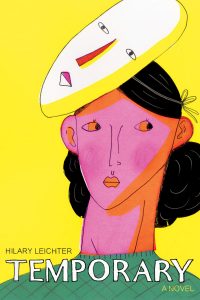 Hilary Leichter, Temporary
Hilary Leichter, Temporary
Coffee House, March 3
I have long been a fan of Hilary Leichter’s fiction, and am very much looking forward to her debut novel, Temporary, which has been described as a Calvino-esque critique of the American Dream, in which the main character takes on ever-stranger job placements, from work on a pirate ship to sitting on the board of a corporation to shining an endless closet of shoes. We could honestly use a little absurdist humor in the face of late-capitalism’s ubiquitous predations. LOL. –Jonny Diamond, Lit Hub Editor in Chief
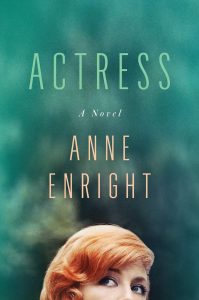 Anne Enright, Actress
Anne Enright, Actress
Norton, March 3
Booker Prize-winning Anne Enright is one of the best writers on families working today. Her newest novel tells the story of Irish theatre legend Katherine O’Dell from the perspective of her daughter, Norah. Bouncing between the glamor of post-war America and the shabbiness of 1970s Dublin, the novel recounts secrets, crimes, and fame, but also, critically, perfectly, explores the relationship between mothers and daughters in light of them. –Emily Firetog, Lit Hub Deputy Editor
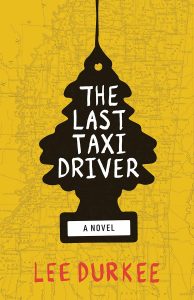 Lee Durkee, The Last Taxi Driver
Lee Durkee, The Last Taxi Driver
Tin House, March 3
Lee Durkee is the funniest writer you’ve never heard of, but that may change. His 2001 debut, Rides of the Midway, is a 1970s coming of age masterpiece, full of quaaludes and clairvoyance and people who know Jesus personally. It managed to capture the improbability of belief, and the magic of how it keeps rebooting in the human species. Now, nearly 20 years later, at last we have Durkee’s second book, his own reboot, and wow is it worth the wait. Not surprisingly, it features a writer whose promising debut has long since been forgotten, who has limped home to Mississippi after years in Vermont, and who now pays the bill driving a Town Car so gut-shot even guys who bring six-packs into the ride wince when it goes over pot holes. Durkee’s narrator is a chatty, friendly observer of the world he encounters. And across one mammoth all night shift, which feels like a future Tom Waits vehicle if there ever was one, we see him cut across all manner of life. He picks up men recently out of prison, and others who belong there. Some passengers clearly just need a listen to. There’s no false hope here, the book suggests, just a new life and a new destination. In our times this creates a spark like flint striking dark rock. –John Freeman, Lit Hub Executive Editor
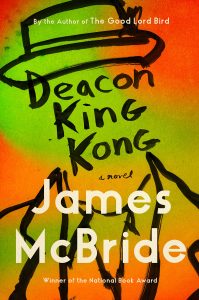 James McBride, Deacon King Kong
James McBride, Deacon King Kong
Riverhead, March 3
National Book Award-winner James McBride returns with a comic new novel set in 1960s New York. After a church deacon named Sportscoat wanders into a Brooklyn housing project and shoots a drug dealer, the people affected by the murder must reckon with Sportscoat’s decision, from the residents to the cops, Italian mobsters to the members of the same Baptist church where Sportscoat once served. These characters lives ultimately intersect in unexpected ways. McBride brings his darkly optimistic sense of humor to an odd tale of a crotchety deacon gone rouge. –Aaron Robertson, Lit Hub Assistant Editor
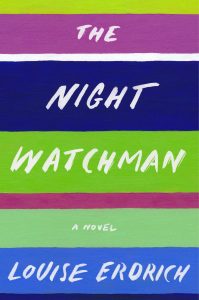 Louise Erdrich, The Night Watchman
Louise Erdrich, The Night Watchman
Harper, March 3
Louise Erdrich is the most enchanting novelist in America today. She has so many registers, and in recent years, so much invented territory which is hers alone. With the publication of LaRose in 2016, she concluded a trilogy of novels about justice. The many ways injustice seeps down into the most intimate relationships. The Night Watchman takes on a new public level of concern. Thomas, the so-called Night Watchman of the title, is the leader of a tribe whose reservation land is under threat. Though mostly a night watchman, he also has to plan to go to Washington and argue before committees on behalf of the people he represents. The book, in many ways, is a study in how we are haunted by people we should stand up for. Patrice, Thomas’s niece, goes to Minneapolis in search of her missing sister, who almost surely has met a grim fate. Other characters begin with good intentions and get distracted. All this is handled with a matter-of-fact grace and awareness that work and family take almost all of her characters’ energy. Ultimately, it is this network, lived rather than built or curated, which comes to their aid. What a thing it is to be alive during Erdrich’s time, to see kindness and cruelty engaged with equal grace. –John Freeman, Lit Hub Executive Editor
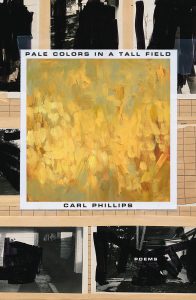 Carl Phillips, Pale Colors in a Tall Field
Carl Phillips, Pale Colors in a Tall Field
FSG, March 3
I have never heard a bad word about poet Carl Phillips, whose next collection considers the intersections of memory, colors, and forgetfulness. If we imagined our recollections as colors, what hues would they have? Which parts of ourselves would appear vividly, and which parts dim? Phillips has the ability to be both enigmatic and reassuring in his work, always going past where you think the poem aims to go, and achieving something greater, as in his poem, “The Same in Sun as It Felt in Shadow”: “Crownless now, intransitive, neither at rest nor / not at rest between to be shaken and to be / less shaken, in his head he’s the magnolia’s / branches, he’s the cast of ravens scattered loose / among them.” –Aaron Robertson, Lit Hub Assistant Editor
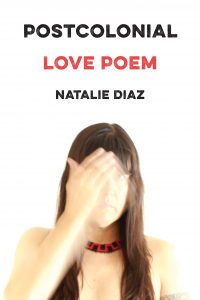 Natalie Diaz, Postcolonial Love Poem
Natalie Diaz, Postcolonial Love Poem
Graywolf, March 3
Natalie Diaz’s second collection has been so highly anticipated, so yearned for, so slowly revealed, one poem at a time, here and there, and now, at last it is here. God, is it beautiful, and like all the best poetry, it makes you want to be in it up to your neck. Furious and tender, warm and embodied, these poems make you want to love, they make you want to think. They cause you to read slowly, and pay attention. Moving from sensual poems addressed to a lover, to poems that make it clear how much of a body like hers must be reclaimed from public space in order to love—like the poem “American Arithmetic,” which ran here at Lit Hub—this is a breakthrough collection. In a world where nothing feels so conservative as a love poem, Diaz takes the form and smashes it to smithereens, building something all her own. A kind of love poem that can allow history and culture and the anguish of ancestors to flow through and around the poet as she addresses her beloved. –John Freeman, Lit Hub Executive Editor
 David Farrier, Footprints : In Search of Future Fossils
David Farrier, Footprints : In Search of Future Fossils
FSG, March 3
What will modern-day civilizations leave behind? David Farrier confronts this question in a book whose premise is both disconcerting and fascinating: that using unprecedented forms of technology, we have built structures and systems that will outlast us. Farrier reports on ocean plastic, nuclear waste, and other industrial and geological forms that humans have created, and I’m curious to see what his book anticipates about the ways that these objects will endure through time, even as this book may raise questions about how far into the future human civilization is meant to last, on a rapidly warming planet. –Corinne Segal, Lit Hub Senior Editor
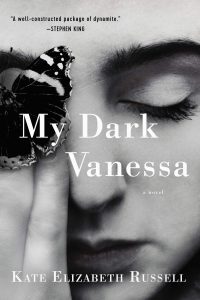 Kate Elizabeth Russell, My Dark Vanessa
Kate Elizabeth Russell, My Dark Vanessa
William Morrow, March 10
Despite the way the term gets bandied about, it’s rare that I ever actually find something “unputdownable”—I am unfortunately quite easily distracted. So believe me when I tell you that this novel had me hooked and good. It’s narrated by Vanessa, who has what she thinks of as a love affair with her teacher when she’s only 15—a love affair that she must re-evaluate years later, when he’s accused of sexually harassing other students. The writing is immersive, the plot swift, but the most impressive thing about this novel is that just where most narratives of this kind usually stop, Russell pushes onward, exploring the lives of her characters both immediately after and years after the events in question. –Emily Temple, Lit Hub Senior Editor
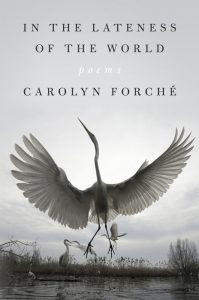 Carolyn Forché, In the Lateness of the World
Carolyn Forché, In the Lateness of the World
Penguin Press, March 10
It has been 17 years since Carolyn Forché published a book of poems, and In the Lateness of the World announces she is back. Coming fast on the heels of her memoir of last years this book is bursting with poems of migration, crossing, and looking back. It is as if the poet is standing, one foot in the river, wondering which way the next crossing will go. Drawing on her own travels and periods of reporting, on the world’s seemingly endless upheaval, these poems move beyond disquiet and creates the charged ethical field in which we all live, all the time, especially at that moment we move. –John Freeman, Lit Hub Executive Editor
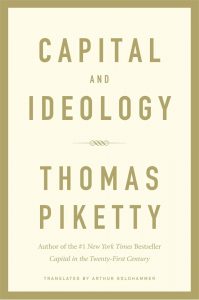 Thomas Piketty, tr. Arthur Goldhammer, Capital and Ideology
Thomas Piketty, tr. Arthur Goldhammer, Capital and Ideology
Belknap, March 10
French economist Thomas Piketty’s 2013 bestseller, Capital in the 21st Century, was an unlikely BIG SERIOUS BOOK smash hit which revealed in rigorous detail what many had come to understand as plainly as an eviction notice nailed to the front door: radical income inequality is very bad. In his latest, Capital and Ideology, Piketty connects the dots and “exposes the ideas that have sustained inequality for the past millennium, revealing why the shallow politics of right and left are failing us today, outlining the structure of a fairer economic system.” Look, normally when I’m talking to someone and they plead for a “politics beyond left and right” I worry I’m talking to a religious libertarian or an anarcho-fascist, but given his earlier work, I’m looking forward to digging into Piketty’s latest. –Jonny Diamond, Lit Hub Editor in Chief
 Clarissa Goenawan, The Perfect World of Miwako Sumida
Clarissa Goenawan, The Perfect World of Miwako Sumida
Soho Press, March 10
In the second novel from the author of Rainbirds, a young woman named Miwako Sumida—a sophomore at Waseda University in Tokyo—hangs herself in a faraway forest, leaving her friends to try to unravel her life and understand her death. Sharlene Teo called it “an elegantly cryptic, poetically plotted Murakami-esque whydunit.” –Emily Temple, Lit Hub Senior Editor
 Michelle de Kretser, On Shirley Hazzard
Michelle de Kretser, On Shirley Hazzard
Catapult, March 10
For a few years, now, the Australian publisher Black Inc. has been putting out a fantastic series in which the best contemporary writers spend 40,000-odd words investigating the work of a literary icon—past titles include the likes of Nam Le on David Malouf and Ceridwen Dovey on J.M. Coetzee. In the latest for the series, released in the US by Catapult, Miles Franklin award-winning novelist Michelle de Kretser ventures part criticism part biography on the absolutely brilliant Shirley Hazzard (do yourself a favor and read The Transit of Venus, if you haven’t). This is the kind of close reading—of a life and its writing—we should have more of. –Jonny Diamond, Lit Hub Editor in Chief
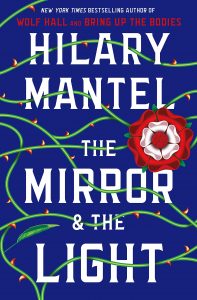 Hilary Mantel, The Mirror & The Light
Hilary Mantel, The Mirror & The Light
Henry Holt, March 10
We’ve been waiting years for this, and now it’s finally (almost!) here. The Mirror & The Light follows Wolf Hall and Bring Up the Bodies as the last novel in Hilary Mantel’s acclaimed trilogy exploring the life of Thomas Cromwell, which has so far garnered two Man Booker prizes for the author, making her the first woman and first Brit to win twice. Sir Peter Stothard, who chaired the Booker judge panel in 2012, said Mantel had “rewritten the book on writing historical fiction” with the series. Mantel herself added in May that the trilogy’s final installment “has been the greatest challenge of my writing life, and the most rewarding; I hope and trust my readers will find it has been worth the wait.” I’m sure we will. –Corinne Segal, Lit Hub Senior Editor
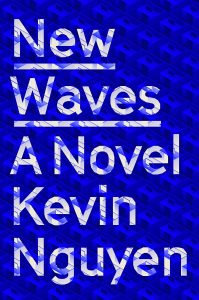 Kevin Nguyen, New Waves
Kevin Nguyen, New Waves
One World, March 10
Full disclosure: Kevin Nguyen is as sharp and funny (and a little mean) in person as he is on twitter, a consistency for which I have ABSOLUTE RESPECT, and that I’m confident will translate perfectly to his debut novel, New Waves. Billed as part page-turning heist story, part incisive critique of startup culture’s oblivious racism, Kirkus Reviews called New Waves, “A blistering sendup of startup culture and a sprawling, ambitious, tender debut.” Which sounds about right. –Jonny Diamond, Lit Hub Editor in Chief
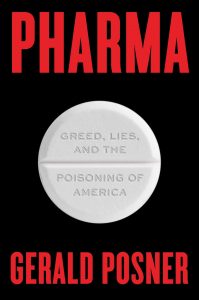 Gerald Posner, Pharma: Greed, Lies. and the Poisoning of America
Gerald Posner, Pharma: Greed, Lies. and the Poisoning of America
Avid Reader, March 10
The cat’s out of the bag on this one, we all know pharma has been a disaster for many Americans, but Gerald Posner specializes in telling you what you don’t know: in his New York Times bestsellers like Case Closed and books like Hitler’s Children or God’s Bankers, what he has perfected is achieving the kind of disgust only a massive research dive can bring. An almost existential, mind-bending level of disgust. The sort of disgust that turns the corner firmly on any light or air flowing the other direction. Considering how much has been written in recent years on the Sacklers and many other pharmaceutical makers who appear in these pages, Posner manages to tell us yet more information. As far back as the 1950s they were running shell companies to disguise sponsored research, and they had garnered the FBI’s attention because they were hiring blacklisted communist writers to work in media arms. The screenwriter Walter Bernstein, interviewed here last year, the only who declined the job. The juggernaut rolled on, and by rolling together the building of their empire with the out of control prescription mentality of modern medicine, Posner has created a medical leviathan for our times. –John Freeman, Lit Hub Executive Editor
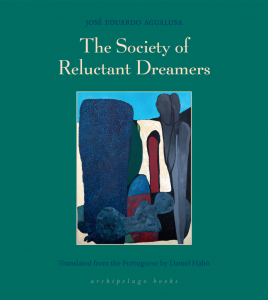 José Eduardo Agualusa, tr. Daniel Hahn, The Society of Reluctant Dreamers
José Eduardo Agualusa, tr. Daniel Hahn, The Society of Reluctant Dreamers
Archipelago, March 10
I loved Agualusa’s A General Theory of Oblivion, in which a woman bricks herself into her own apartment and doesn’t come out for 30 years (dream), so I’m looking forward to the next of his novels to be translated from the Portuguese by Daniel Hahn. It is also about the history of Angola, but here the protagonist is free to wander, interviewing writers (like Julio Cortázar) and revolutionaries—if only in his dreams. –Emily Temple, Lit Hub Senior Editor
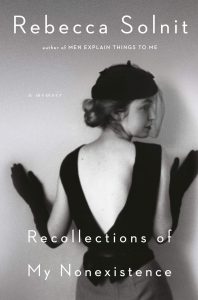 Rebecca Solnit, Recollections of My Nonexistence
Rebecca Solnit, Recollections of My Nonexistence
Viking, March 10
Over the past several years, Rebecca Solnit has established herself as a guiding light in these dark times. From Men Explain Things To Me to Call Them by Their True Names to the pieces here on Literary Hub dot com, she has written about almost everything. She’s a trusted voice. Whether she’s writing about feminism or the environment or politics, she often asks: how did we get here? In Recollections of My Nonexistence, she answers a different question, which is: how did you get here? This memoir tells the story of Rebecca Solnit against the backdrop of 1980s San Francisco and is a fascinating homage to the books and people who shaped her worldview. –Katie Yee, Book Marks Assistant Editor
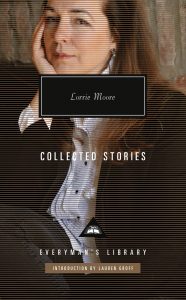 Lorrie Moore, Collected Stories
Lorrie Moore, Collected Stories
Everyman’s Library, March 12
She is the helium which has been piped into the short story, the writer who has done the rare thing in American humor: turning the mundane extraordinary, rather than the other way around. Now, at last, all four of Lorrie Moore’s collections have been stuffed into one big, delicious book. What a gift this will make to readers and young writers. All the holiday charade parties run amok, the love affairs that fall on characters like a safe from the sky. The shattering trips to the ER with children. To read Moore’s stories is to feel the ecstatic, terrifying lightning zot of being alive. The risk and the companionship of being in a world where the rewards are few. She makes her bleakness a cozy blanket, so gorgeously made. There’s not a boring sentence in the 776 pages here. And very few writers work in prose transfer this kind of energy from brain pan to reader. –John Freeman, Lit Hub Executive Editor
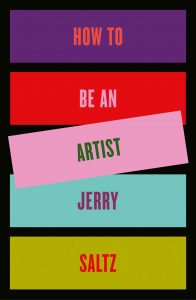 Jerry Saltz, How to Be an Artist
Jerry Saltz, How to Be an Artist
Riverhead, March 17
You probably know Jerry Saltz as the Pulitzer Prize-winning art critic for New York magazine, the erstwhile art critic for The Village Voice, and the marquee judge on the short lived reality show Work of Art: The Next Great Artist. So it’s safe to say he’s more than qualified to write an inspirational handbook for the wannabe-artist in all of us. –Emily Temple, Lit Hub Senior Editor
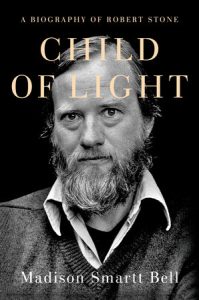 Madison Smartt Bell, Child of Light: A Biography of Robert Stone
Madison Smartt Bell, Child of Light: A Biography of Robert Stone
Doubleday, March 17
The time is ripe for a Robert Stone revival. A moralist disguised as a hippy, a reporter who went to war and became a novelist: he was the closest thing America had to Graham Greene. Whereas Greene saw England’s empire failing before most, Stone realized America had an imperium far earlier than most. He also saw through sacred pieties of American power faster than just about any novelist of his time. He might have looked like a Hemingway character, with a ship captain’s beard, but Stone was a rare kind of moralist all the way through. From his pages have sprung novelists as diverse as Jennifer Egan and his friend, Ken Kesey, with whom he traveled on the merry prankster bus. “We always called him the merry paranoid,” Kesey joked once. “Bob Stone was the first one to come along to make paranoia work for him.”
This spring there are three ways to leap into his work afresh or again. Library of America has put together three of Stone’s best books into one volume—his wild, psychedelic Vietnam novel, The Dog Soldiers, which won the National Book Award; along with Flag for Sunrise and Outerbridge Reach, also finalists in the 1980s and 1990s. The former is the kind of Latin American thriller Tom Clancy would write if he thought, the latter a beautiful, unnerving book about a man circumnavigating the world by sailboat. Stone made his restlessness work for him, and it meant you can enter his books and go many places. The Eye You See With, a book of selected nonfiction, shines most though when it’s about America. In one essay, he attends the 1988 Republic National Convention and witnesses the naked contempt on display for poverty, an issue Stone took personally, having been destitute himself.
Raised at an orphanage after his mother was diagnosed schizophrenic. A runaway to the navy at 17. He remained a skeptic his whole life. In the early 1990s, while many liberals were praising the strategy of don’t ask don’t tell, Stone unloaded on the military for not only allowing this fiction, but not investigating sexual assault of female officers. Madison Smartt Bell brings this and many other sides of Stone alive in his biography, Child of Light, which is particularly good at showing how a man who grew up alone and sometimes afraid could find himself at home in the world. Could turn himself, through work and guilt, and then mercy, into a man capable of living beyond paranoias. –John Freeman, Lit Hub Executive Editor
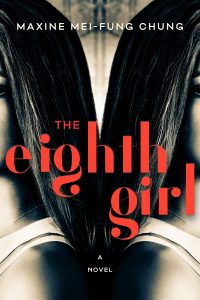 Maxine Mei Chung, The Eighth Girl
Maxine Mei Chung, The Eighth Girl
William Morrow, March 17
Alexa Wu is not who you think she is: she has alternate personalities she cannot control. Only her stepmother, her shrink, and her best friend, the mysterious Ella, know about her condition. When Alexa gets a job at a high-toned gentleman’s club in London, she is drawn into a dark world where she comes close to discovering Ella’s secrets. But Alexa must keep it together in trying circumstances if she is going to help her friend and stay intact. –Lisa Levy, CrimeReads Contributing Editor
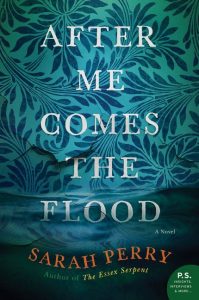 Sarah Perry, After Me Comes the Flood
Sarah Perry, After Me Comes the Flood
Custom House, March 17
Fun fact: Sarah Perry, the bestselling author of The Essex Serpent, wrote After Me Comes the Flood first. Her fans will not be disappointed. Opening with a delicious premise, the mystery and confusion unfolds immediately for plain John Cole, whose car one day breaks down in the middle of a country road. When he approaches a house, a stranger—a woman, who is laughing (cue the tension)—says she has been waiting for him. Inside her house, in fact, awaits a group of people who seem to know and be expecting him. But how could they have predicted this would happen? How could they have expected him? And, above all, what can they want? –Eleni Theodoropoulos, Lit Hub Editorial Fellow
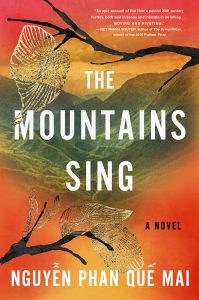 Nguyen Phan Que Mai, The Mountains Sing
Nguyen Phan Que Mai, The Mountains Sing
Algonquin, March 17
In this panoramic epic, Hương, a middle age writer returns to Hanoi and relives the stories of her family’s long and tortured past. She recalls the stories her grandmother told of being raised in Vietnam before the sudden, brutal land reforms. How her family went from wealthy to impoverished overnight, and her daughter, Hương’s mother, suffered terribly as they moved to Hanoi at the mercy of South Vietnamese soldiers. Like the work of Duong Thu Huong, who deserves the Nobel one day, this book brings to life a crucial part of Vietnamese history from within. You heart will not leave this book untouched. –John Freeman, Lit Hub Executive Editor
 Harry Dodge, My Meteorite: Or, Without the Random There Can Be No New Thing
Harry Dodge, My Meteorite: Or, Without the Random There Can Be No New Thing
Penguin Books, March 17
In this essentially uncategorizable memoir-cum-meditation-cum-manifesto-cum-map of the world, Harry Dodge considers the death of his father and the life of his mother, as well as a meteorite ordered from eBay, and the nature of love and art. “I could say this is the smartest memoir I ever read but that’s pulling us back to the safe place,” wrote Eileen Myles. “We are animals, machines, friends, reading things and we’ve never been talked to this way before. Seductive and wise, My Meteorite is the conversation you want.” Not for nothing, but Ben Lerner, Eula Biss, Miranda July, Wayne Koestenbaum, Ocean Vuong, and a host of others seems to agree. –Emily Temple, Lit Hub Senior Editor
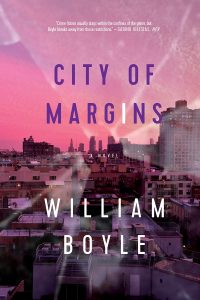 William Boyle, City of Margins
William Boyle, City of Margins
Pegasus, March 17
In the last few years Boyle has quietly proven he can take on any number of kinds of crime fiction, from a screwball farce to a hardboiled noir to a heartfelt examination of lonely people whose lives cross. His territory is Brooklyn, but not the borough of Williamsburg tourists and Brooklyn Heights millionaires: his characters live modestly in places like Gravesend, away from the gentrifiers out by Coney Island. In Margins Boyle again taps his knack for creating a world full of characters on the make or about to get taken in the ecosystem of noir. –Lisa Levy, CrimeReads Contributing Editor
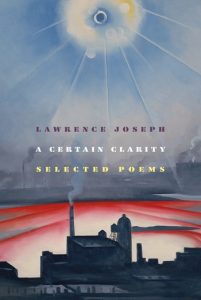
Lawrence Joseph, A Certain Clarity: Selected Poems
FSG, March 17
In a year full of handy new selections and long overdue returns, the poetic event of 2020 ought to be the publication of Lawrence Joseph’s A Certain Clarity. Raised the son of a Lebanese-American grocer in Detroit, he grew up in that city’s riots, then studied English Literature at Cambridge and law at Michigan. Moved to New York at the height of the 1980s wealth creation. Walking the city’s streets, he has been a Virgil in our psychotically greedy times. He hears and sees New York City with a gumshoe’s love and an outsider’s ear for pain. Reading through these poems, which date back to the 1970s, it’s clear Joseph was a moralist before it was fashionable, deeply tuned to justice because he had lived through its opposite. As an Arab-American, he has watched as one after another U.S. government propped up, patronized, and undercut regimes throughout the Middle East. The range of his voice is simply awesome. He can speak low, and with a painterly attention to light; he sings love songs of marriage and the solitude of two; and when he’s angry, he can weave a seething prosody that’d make Blake wonder if the angels he saw were demons. In our sinister times, nothing coming out this year, from America or elsewhere, will make such good companion reading to those wondering if the world really is on fire. Would that our times were not catching up so bleakly with Joseph’s clear vision. –John Freeman, Lit Hub Executive Editor
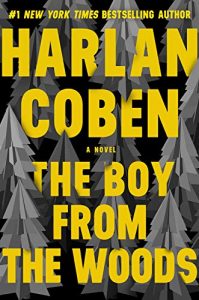 Harlan Coben, The Boy from the Woods
Harlan Coben, The Boy from the Woods
Grand Central, March 17
Coben may be best known for his twisty plots, but when it comes crafting characters, he’s just as good. Case in point: The Boy From the Woods introduces a compelling new series lead, the mononymed Wilde, once a feral boy found in the wilderness, and now an ex-military operative who still has no memory of his early childhood. Enter a missing girl and a friend’s plea to help find her, and you’ve got another fantastic thriller from one of the best. –Molly Odintz, CrimeReads Associate Editor
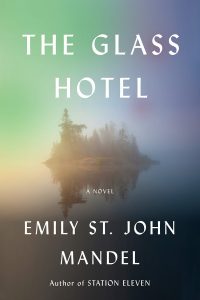 Emily St. John Mandel, The Glass Hotel
Emily St. John Mandel, The Glass Hotel
Knopf, March 24
Mandel’s first novel since her 2014 hit Station Eleven is also an apocalypse novel, in a way—only there are many apocalypses, and they are much smaller, and much more personal. This luscious, mesmerizing book follows a cast of characters who orbit, in various ways, a man running an elaborate Ponzi scheme—a scheme that, of course, must eventually come to an end. To say more would be to rather give it away, but suffice it to say that Mandel’s latest is as compelling as Station Eleven, but somehow more elegant, more haunting, and stranger. –Emily Temple, Lit Hub Senior Editor
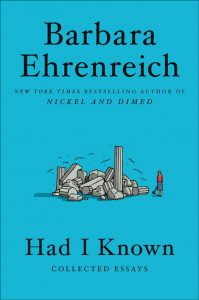 Barbara Ehrenreich, Had I Known: Collected Essays
Barbara Ehrenreich, Had I Known: Collected Essays
Twelve, March 24
I have long had an enormous place in my heart for the journalism of Barbara Ehrenreich, who I instinctively pair in my head with Molly Ivins on some muckraking road movie, two honest-to-goodness social justice warriors lighting out for the oil fields to take names and stir up shit. Ehrenreich made her name with Nickel and Dimed (2001), a must-read work of immersive reporting in which she gave lie to the central tenet of the American Dream: if you work hard, 40 hours a week, you’ll make it. In the subsequent 20 years, we’ve come to understand just how devastating are the consequences of income inequality in a country that makes you pay for everything out of pocket: your health, your childcare, your education… And Ehrenreich’s been there the whole time, reporting and writing about life in the richest country in the world. –Jonny Diamond, Lit Hub Editor in Chief
 N. K. Jemisin, The City We Became
N. K. Jemisin, The City We Became
Orbit, March 24
N.K. Jemisin is back. The City We Became has been described by Kirkus Reviews as “a love/hate song to and rallying cry for the author’s home of New York.” The premise of Jemisin’s speculative novel is that every great city has a human avatar who leads it through its maturity, while also resisting an extraterrestrial nemesis that seeks to destroy it. New York’s avatar, however, is too weak to fight alone, and thus each of the city’s five boroughs produces its own avatar: a diverse cast of characters named after the boroughs themselves. Will the five avatars come together to triumph over the mysterious Woman in White? Jemisin uses her story to speak on gentrification, police violence, and other contemporary issues that have never before been addressed so directly in her fiction before. –Aaron Robertson, Lit Hub Assistant Editor
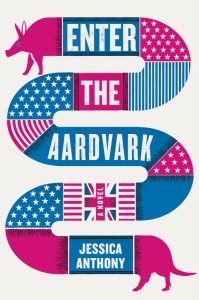 Jessica Anthony, Enter the Aardvark
Jessica Anthony, Enter the Aardvark
Little, Brown, March 24
One day, in Washington D.C., “millennial Congress-bro” Alexander Paine Wilson (a Republican) wakes up to find an enormous taxidermied aardvark on his doorstep, kicking off an outrageous string of events and a novel that romps back and forth between Victorian England and contemporary America to great effect. “If you’ve been wondering, as I have, where the spirit of Nathanael West might be in these berserk and awful times,” wrote Joshua Ferris, “enter Jessica Anthony. With her highly inventive, ever attentive, and morally serious (as all great comedy must be) Enter the Aardvark, she estranges all over again our deplorable political moment, and thereby helps make it bearable.” A feat indeed. –Emily Temple, Lit Hub Senior Editor
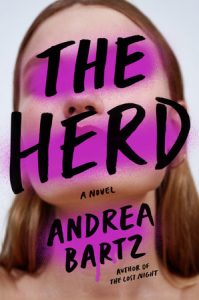 Andrea Bartz, The Herd
Andrea Bartz, The Herd
Crown, March 24
Her hard-hitting debut, The Lost Night, has made Andrea Bartz one to watch, and her second novel, The Herd, confirms her reputation. As The Herd begins, the glamorous owner of a feminist coworking startup vanishes on the eve a big announcement about the company. It’s up to her not-so-faithful stooges to find out what’s going on, and uncover the dark secrets behind the founding of the company. As someone whose building was recently taken over by a WeWork and who now has to wait 10 minutes for the elevator, I can’t endorse this book enough. –Molly Odintz, CrimeReads Associate Editor
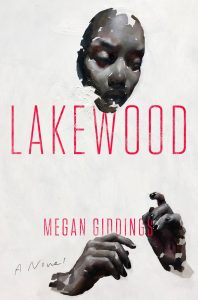 Megan Giddings, Lakewood
Megan Giddings, Lakewood
Amistad, March 24
There is something wrong with Lakewood, Michigan, and a young black woman named Lena Johnson is about to find out what that is. When Lena’s grandmother dies and the family’s debt comes to light, Lena drops out of college to take up a high paying job in the isolated town of Lakewood. She lives a comfortable life here in exchange for her participation in a secret program where strange things are happening: eye drops change the color of people’s irises, pills promise to get rid of bad thoughts, and so on. Like Get Out, Megan Giddings’ Lakewood addresses the real historical horror of scientific “experimentation” on black bodies. –Aaron Robertson, Lit Hub Assistant Editor
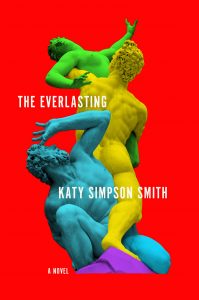 Katy Simpson Smith, The Everlasting
Katy Simpson Smith, The Everlasting
Harper, March 24
This ambitious historical novel spans some 2,000 years, following four characters in the legendary and ever-dramatic city of Rome. In the eternal city, Smith pits her characters—a monk, a biologist, a martyr, a “bastard princess”—up against our most elemental questions: of love and faith and time. Sometimes Satan wryly comments, which is the thing I’m looking forward to most of all. –Emily Temple, Lit Hub Senior Editor
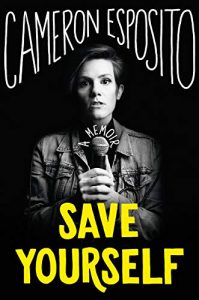 Cameron Esposito, Save Yourself: Essays
Cameron Esposito, Save Yourself: Essays
Grand Central, March 24
In the last couple of years, Cameron Esposito has made comedy from the forefront of representing queer life, including in the show Take My Wife, a Netflix comedy special that raised more than $70,000 for the Rape, Abuse & Incest National Network, and a new set chronicling her experience with lesbian divorce. Now, she’s releasing an essay collection that follows her upbringing in a strictly Catholic environment to her struggle to gain traction as a standup comic in a field hostile to women and queer people. Even as a fan who’s familiar with her story, I’m looking forward to seeing what new additions the book has to offer. –Corinne Segal, Lit Hub Senior Editor
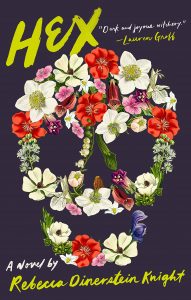 Rebecca Dinerstein Knight, Hex
Rebecca Dinerstein Knight, Hex
Viking, March 31
Academics tie themselves up into a pretzel of betrayal and desire in Rebecca Dinerstein Knight’s propulsive second book, which reads a tiny bit like AS Byatt after dark. When Nell is expelled from a PhD program in botany after her lab partner dies in a toxic experiment, she retreats to Brooklyn to lick her wounds. Then becomes obsessed with finishing her late partner’s work. Unfolding as a series of notebook entries, Hex tracks Nell’s growing obsession with Dr. Joan Kallas, her advisor, and a staggering number of side affairs that begin happening as she chases a poison that will undo itself. This is a bold and highly charged book that makes entertainment seem like not such a bad word. –John Freeman, Lit Hub Executive Editor
 César Aira, tr. Katherine Silver, Artforum
César Aira, tr. Katherine Silver, Artforum
New Directions, March 31
The hero of Cesar Aira’s new novel is obsessed with the magazine Art Forum, and over this 90 page novel, he finds a way to show us why without once becoming the boring guy at the cafe who has a thing or two he knows and wishes to tell you. Once again Aira proves certain laws of gravity just don’t seem to apply to him. –John Freeman, Lit Hub Executive Editor












